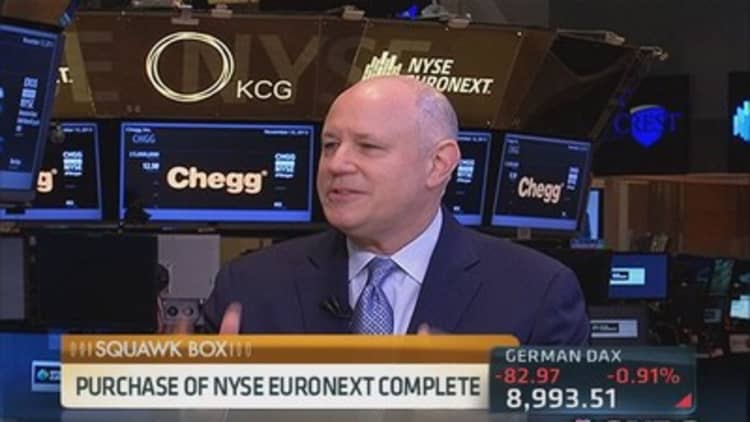The new boss of the NYSE speaks out on the floor and what's wrong with trading.
This morning on our air, I spoke with the new boss of the NYSE, Intercontinental (ICE) CEO Jeff Sprecher, who completed his acquisition of NYSE Euronext last night.
Sprecher made it clear that—while he did not make any long-term commitments to keep the NYSE floor—the Twitter IPO and the extensive coverage CNBC provided around how the IPO was priced has left him with a renewed appreciation for the value of human participation in the markets.
"I ended up pushing back a meeting I was scheduled to go to because I wanted to watch the open, see the price, watch the founder, the management team," he told me.
"Did it restore or increase your faith in the value of floor-based trading?" I asked.

"Absolutely. ... There is no other New York Stock Exchange floor; there is nothing like this. And in a market where we don't really have full confidence in how our stocks are trading, there's something really rewarding about being here, and seeing human beings."
Jeff also said he would like to see more retail trading activity at the NYSE. That's a tall order—most of the NYSE's customers are high-frequency trading firms. Retail order flow—orders that go through discount brokers like Schwab or ETrade—get sold off to shops like Knight or Citadel or UBS that match off the buy and sell orders using their own inventory. Very little of that business ever reaches the NYSE floor. And orders that go through fund families like Vanguard or Fidelity often end up routed into dark pools, where 40 percent of trading activity now occurs.
How do you make changes to an entrenched market structure?
"You start by talking about it and working to change behavior to change the trajectory of the way things are going. I've been pretty open and transparent about my concerns, and I've gotten flack from my peers who've asked me not to talk about it, and I think that is the wrong way to go. We can bring people back."
Still, he has a lot of other issues to address. I pointed out to him, that while most questions he is getting revolve around what will happen to the iconic NYSE floor, most of his business is elsewhere.
Here's a breakdown of where the revenues come from for the combined company, year to date:
- Futures: 46 percent
- U.S. Equities: 5 percent
- Europe Equities: 5 percent
- U.S. Options: 4 percent
- Listings: 12 percent
- Other (technology services, data fees, etc.): 28 percent
Notice that only 5 percent of the revenues come from U.S. equities, which is the NYSE floor and electronic trading. Most of the business is in the futures area: energy futures, agricultural futures, and the LIFFE European derivatives business that ICE acquired with the NYSE.
So where's the growth? Sprecher made it clear he wanted to become the trading platform of choice.
"We're a multi-asset class network. We can sit on people's desktops and allow them to trade everything around the world. That's the goal."
Sprecher has indicated he will provide more details on what parts of the NYSE he plans to keep, and which part he doesn't, in a few days.
He has already said he plans to do an IPO of Euronext—the stock trading operations in Europe, including the bourses in Paris, Lisbon, Amsterdam and Brussels. Less clear is what would happen if a buy re-emerged ... say, Nasdaq or the London Stock Exchange, or whether the national regulators of these bourses would even allow a sale to someone else.
Then there's the delicate issue of cost savings, most of which involves reducing head count. He has pledged to provide $450 million in cost reductions in the next two years. That is an ambitious goal.
The problem is simple: ICE was a small company that ran an electronic trading operation with a small group of people. But can you keep streamlined management when you double your market cap, to $20 billion?
Do you manage it differently? Running the NYSE is an entirely different proposition than running ICE.
When the crap hits the fan—whether it's a trading glitch or a major market drop--the whole world calls the NYSE. U.S. Senators. The SEC. The press. Everyone. You are front and center.
My point is that managing the NYSE is a much bigger, more complex animal than managing ICE.
—By CNBC's Bob Pisani


